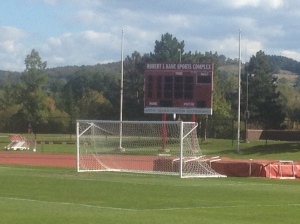This August students at Cornell University and Ithaca College founded chapters of the organization, Athlete Ally, a program dedicated to ending homophobia and transphobia in sports.
Atticus DeProspo, a soccer player at Cornell, founded the chapter for the university in August. He hopes it will help foster a safe and respectful environment for all athletes, including those who are LGBT.
“When it comes to soccer, the sport is all that matters,” said DeProspo. “If you can play, you can play. We work hard together toward common goals of repeating as Ivy League Champions and making a run in the NCAA tournament. I am looking to spread the message of tolerance, respect and acceptance for all human beings in the athletic community.”
DeProspo published a ‘coming out’ letter early last month, inspired by his professional soccer role model Robbie Rogers. In it, he explains the ‘locker room’ culture and the stigma that still exists around homosexuality in the athletic world.
He told Ithaca Week his experience as a gay athlete has been a very positive and enjoyable one, but that is not the case for everyone.
According to Campus Pride’s 2012 LGBTQ National College Athlete Report, which included surveys of 394 students — out of nearly 9,000 NCAA athletes surveyed — who identified as LGBQ (questioning), these athletes are two times more likely to experience harassment than their heterosexual teammates.
One in four said they felt pressure to remain silent about their sexual identity among teammates, and 21 percent revealed they were targeted by derogatory comments online and through social media.
Cornell athletics teams have no data for the participation of LGBT athletes in their varsity sports, but the athletics department has welcomed the new organization.
“We are very supportive as a department to Athlete Ally and our new chapter,” said Sarah Wattenberg, The Andrew ’78 and Margaret Paul Director of Student-Athlete Support Services. “Its foundation is about equality and inclusiveness, which aligns with Cornell University’s mission and motto, ‘Any person, any study.’”
Before coming out, one of the people DeProspo confided in was Brian Healey, who serves as Program Coordinator for the national Athlete Ally organization. He too shared his story during his final year as Captain of Men’s Tennis at Saint Michael’s College in Colchester, Vt.
For Healey, beginning a conversation around this issue is an important first step to creating the most inclusive environment for the LGBT community.
“Intolerance…has many root causes, ignorance being one of them. That’s why work so hard to educate as many people as possible about how damaging and lasting this can be,” said Healey.
The Cornell chapter of Athlete Ally is currently organizing an advocacy campaign video called “Cornell You Can Play,” as well as developing ally training in the athletic community. It meets bi-weekly Tuesdays at 8:30 p.m. in the Kaplan Room of Bartels Hall.
Atticus DeProspo can be reached at awd39@cornell.edu



